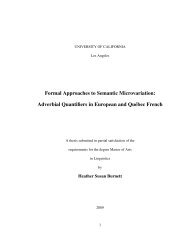Post Verbal Subjects and Agreement in Brazilian Portuguese
Post Verbal Subjects and Agreement in Brazilian Portuguese
Post Verbal Subjects and Agreement in Brazilian Portuguese
Create successful ePaper yourself
Turn your PDF publications into a flip-book with our unique Google optimized e-Paper software.
fotos das men<strong>in</strong>as is post-verbal <strong>and</strong> a causa da briga is pre-verbal. Differently<br />
from the verb be, ord<strong>in</strong>ary transitive verbs, such as revelar ‘reveal’, lead to the<br />
obligatory agreement pattern, regardless of word order (cf. (38) <strong>and</strong> (41) to (42) <strong>and</strong><br />
(43)): 7<br />
(42) A causa da briga revelou/ *revelara-m as fotos das<br />
the cause of-the fight revealed.sg/ revealed-pl the pictures of-the<br />
men<strong>in</strong>as.<br />
girls<br />
‘The cause of the fight revealed the pictures of the girls.’<br />
(43) As fotos das men<strong>in</strong>as revelara-m/ *revelou a causa da<br />
the pictures of-the girls revealed-pl/ revealed.sg the cause of-the<br />
briga.<br />
fight<br />
‘The pictures of the girls revealed the cause of the fight.’<br />
This section has shown that the distribution of the agreement pattern is<br />
determ<strong>in</strong>ed by both word order <strong>and</strong> verb type. The variant pattern arises <strong>in</strong> three<br />
7 This example is based on examples <strong>in</strong> English <strong>and</strong> Italian <strong>in</strong> Moro (1993, 1997). Revelar was<br />
chosen simply for ease of comparison between a transitive verb <strong>and</strong> be, as it happens to naturally<br />
allow either DP above as the subject or object (illustrat<strong>in</strong>g the po<strong>in</strong>t that word order alone is not<br />
solely determ<strong>in</strong><strong>in</strong>g agreement). Revelar seems to be an ‘ord<strong>in</strong>ary’ transitive verb, as described <strong>in</strong> the<br />
text, <strong>in</strong> that it seems to behave like other transitive verbs, for example <strong>in</strong> its ability to be passivized:<br />
(i) A causa da briga foi revelada pelas fotos das men<strong>in</strong>as.<br />
the cause of-the fight was revealed by-the pictures of-the girls<br />
‘The cause of the fight was revealed by the pictures of the girls.’<br />
(ii) As fotos das men<strong>in</strong>as foram revelads pela causa da briga.<br />
the pictures of-the girls were revealed by-the cause of-the fight<br />
‘The pictures of the girls revealed the cause of the fight.’<br />
12

















